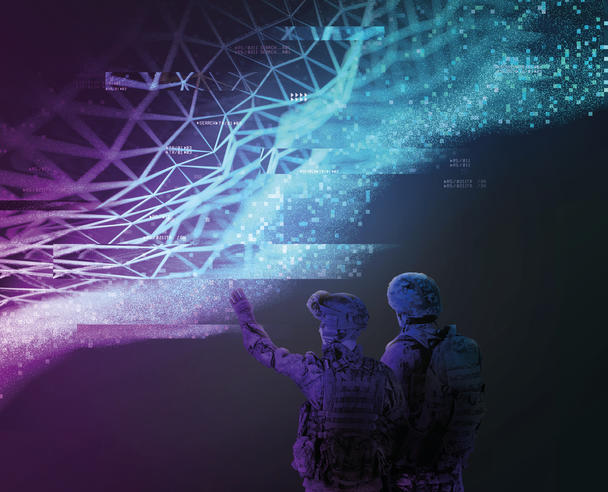Technological innovations for a digitalised battlespace

Technological innovations for a digitalised battlespace
Digital age technology is advancing at a rapid pace, redefining the future of Defence technology. While the necessity to evolve is nothing new, recent advancements have created a shift in focus from physical equipment to virtual connectivity and networks.
Virtual Reality, Artificial Intelligence and Big Data are just some of the elements underpinning Defence in the digital age. Chand Svare Ghei, Chief Engineer at Airbus Secure Communications, goes into more detail on what these technological advancements will bring to the Defence industry.
Internet of Things (IoT)
Internet of Things describes the network connection of physical objects. Embedded with sensors, software and other technologies, the objects connect and exchange data with other devices and systems over the internet, controlling and monitoring the environment, the objects within it and the people that interact with it; and the Internet of Military Things (IoMT) is no different.
From automated home appliances, to wearable health monitors, to smart cars; the use case for IoT continues to expand as it brings benefits to multiple industries, including Defence. Integrating IoMT through sensors, actuators and control systems into military infrastructures can enhance their efficiency and effectiveness, giving full situational awareness and more efficient analysis of data. From monitoring soldier’s wellbeing, to inventory management to gathering C4ISR system data; IoMT works to bring all the information together into a single ecosystem.
Artificial Intelligence (AI)
Artificial Intelligence is a collection of different technologies, computers and machines that mimic the problem solving and decisions making capabilities of the human mind. Or put simply, it combines computer science and robust datasheets to enable problem solving.
From enabling autonomous systems to conduct missions, to achieving sensor fusion, to automating tasks; the expectations of AI within defence are endless. Through the use of machine learning and detection of anomalies, AI systems will be able discover patterns and inform the operator if anything unusual could potentially happen. Predictive algorithms will also play a major role in monitoring as well as network administration, as they can be used to tackle future problems proactively before they happen. Due to the large data sets available for analysis, AI is also useful for Intelligence as it can automate the workload of analysists, saving time sifting through data for actionable information, and allowing them to make more efficient and timely decisions.
Virtual Reality (VR)
Virtual Reality is the use of computer technology to create a simulated, 3D environment which can be explored and interacted with. This immersive technology is able to manipulate objects or perform a series of actions to create the illusion of reality.
For military environments, VR supports equipment and operational training, providing soldiers with combat training in conditions that cannot be replicated. Using VR in such a way places personnel in new environments and activities, enhancing their skills and increasing their situational awareness.
Big Data
Big data is the combination of structured, semi-structured and unstructured data that is collected by organisations. It is the larger, more complex data sets that traditional data processing software cannot manage. It is often used in machine learning projects, predictive modelling and advance analytics to gain insights and improve strategic decisions.
When it comes to Defence, Big Data is key as it allows militaries to access large volumes of information that are essential for their daily operations. With real-time access, militaries can identify areas that require attention, make better and timelier decisions and enact the necessary changes; decreasing operational risks whilst increasing the safety of troops and civilians.
Defence in the digital age
In Defence, information is currency; the ability to collect, prioritise, process, share and fuse data is critical for Defence operations to succeed. Whether peace, crisis or competition, it is vital militaries adopt new practices and technologies to ensure readiness and increase strategic decision making processes.
Airbus Defence and Space is Europe's leading supplier of military systems in command and control, intelligence, monitoring and reconnaissance services, IT communications infrastructure and command support; this means that developing and operating interconnected networks and technology is in our DNA. Airbus is striving for a fully integrated, digitalised, collaborative and agile operational environment across all domains with the Multi-Domain Combat Cloud (MDCC). The MDCC is about enhancing defence power through information superiority; it is about having the right information at the right time.
Want to know more?
Read our latest articles here: